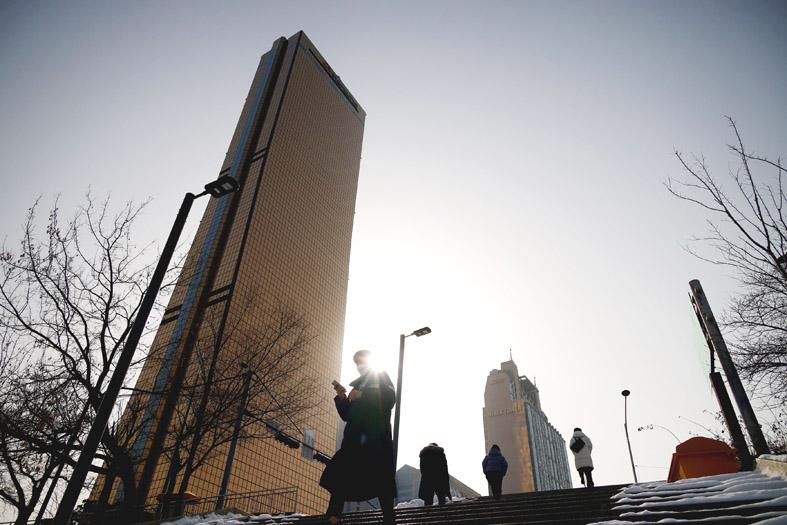South Korea has lost the most jobs in two decades and the unemployment rate hit a 10-year high as the businesses slashed hiring amid the COVID-19 pandemic.
The nation shed 628,000 jobs last month compared with the prior year, the 10th straight monthly drop and the most since February 1999.
Restaurants and hotels were the hardest hit, but manufacturing also lost more than 100,000 jobs for a second month, signaling that a recovery in tech exports has yet to translate into increased employment.

Photo: Reuters
The unemployment rate jumped to 4.6 percent, the highest since January 2010.
Economists had forecast a reading unchanged from November last year’s 4.1 percent.
The worst job losses since the late 1990s Asian financial crisis could spur more calls for the Bank of Korea to put increased emphasis on employment in setting monetary policy.
The bank is expected to hold rates at a record low when it meets tomorrow.
The deteriorating labor market also adds pressure on the government and lawmakers to come up with more ways to shore up the economy.
South Korean Minister of Finance Hong Nam-ki said in a statement that difficulties in the labor market are likely to persist through next month and pledged to do more to combat them.
South Korean President Moon Jae-in’s administration plans to give 4.6 trillion won (US$4.2 billion) in cash handouts to millions of South Koreans before next month’s Lunar New Year holiday and front load fiscal spending in the first half of the year.
The damage to the jobs market reflects the tightening of social distancing rules after the country’s daily infection tally last month surged above 1,000.
Curtailed hours for most shops, and the shutdown of karaoke parlors and other businesses have hurt workers in the service sector, especially during the holiday season.
Restaurant and hotels shed 313,000 jobs, roughly double the losses of November last year.
Employment in the manufacturing industry was down by 110,000 workers in the month, a slightly smaller decline than in the previous month, but still worrisome given the economy’s dependence on exports and factory work.
“Manufacturing has been under pressure from greater labor costs even before COVID-19 and the virus only adds to the trouble,” said Sung Tae-yoon, a professor of economics at Yonsei University in Seoul. “An exports recovery isn’t necessarily going to translate into more jobs in the tech sector, which has already automated much of its manufacturing.”
Construction continued to see improving employment, adding 23,000 workers, amid a government push to increase public housing.

South Korea’s equity benchmark yesterday crossed a new milestone just a month after surpassing the once-unthinkable 5,000 mark as surging global memory demand powers the country’s biggest chipmakers. The KOSPI advanced as much as 2.6 percent to a record 6,123, with Samsung Electronics Co and SK Hynix Inc each gaining more than 2 percent. With the benchmark now up 45 percent this year, South Korea’s stock market capitalization has also moved past France’s, following last month’s overtaking of Germany’s. Long overlooked by foreign funds, despite being undervalued, South Korean stocks have now emerged as clear winners in the global market. The so-called “artificial intelligence

CONFUSION: Taiwan, Japan and other big exporters are cautiously monitoring the situation, while analysts said more Trump responses ate likely after his loss in court US trading partners in Asia started weighing fresh uncertainties yesterday after President Donald Trump vowed to impose a new tariff on imports, hours after the Supreme Court struck down many of the sweeping levies he used to launch a global trade war. The court’s ruling invalidated a number of tariffs that the Trump administration had imposed on Asian export powerhouses from China and South Korea to Japan and Taiwan, the world’s largest chip maker and a key player in tech supply chains. Within hours, Trump said he would impose a new 10 percent duty on US imports from all countries starting on

STRATEGIC ALLIANCE: The initiative is aimed at protecting semiconductor supply chain resilience to reduce dependence on China-dominated manufacturing hubs India yesterday joined a US-led initiative to strengthen technology cooperation among strategic allies in a move that underscores the nations’ warming ties after a brief strain over New Delhi’s unabated purchase of discounted Russian oil. The decision aligns India closely with Washington’s efforts to build secure supply chains for semiconductors, advanced manufacturing and critical technologies at a time when geopolitical competition with China is intensifying. It also signals a reset in relations following friction over energy trade and tariffs. Nations that have joined the Pax Silica framework include Japan, South Korea, the UK and Israel. “Pax Silica will be a group of nations

Chinese artificial intelligence (AI) start-up DeepSeek’s (深度求索) latest AI model, set to be released as soon as next week, was trained on Nvidia Corp’s most advanced AI chip, the Blackwell, a senior official of US President Donald Trump’s administration said on Monday, in what could represent a violation of US export controls. The US believes DeepSeek will remove the technical indicators that might reveal its use of American AI chips, the official said, adding that the Blackwells are likely clustered at its data center in Inner Mongolia, an autonomous region of China. The person declined to say how the US government received